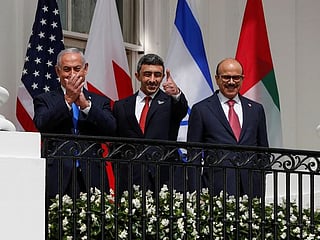Abraham Accords: An opportunity for people in the Arab world
UAE-Israel treaty will open positive avenues for the facilitation of Palestinian rights

Also In This Package
The true growth of a Nation is more than economic accomplishments and world-class infrastructure. It is the ability to nurture peace and camaraderie within and outside its borders and take uninhibited action for it.
The UAE has been a beacon of tolerance and peace among its Arab counterparts as well as globally, and this historic peace treaty makes the UAE the first Gulf Arab state to extend its hand for Arab-Israel cooperation since 1994.
To take this first step, for hope to prevail over despair, amid the risk of scepticism is profound. While now the move is being lauded by many for ‘Different Reasons’, it is essential to recognise the spirit in and for which the agreement was made.
If we can take slow but steady steps towards building a more peaceful and trustful future where people of the world, can depend on each other instead of being seeped in conflict, this treaty would be the exemplification of thatHaleema Humaid Al Owais
‘Hotels’ within the territory were one of the most searched for words online in the UAE right after the historic peace treaty was announced according to an Emirati official quoted in a BBC story on this game-changer agreement.
This can be understood as an indicator of the number of people who would like to visit Palestine setting aside long-standing and/or inherited dispute.
We often claim ‘Dialogue’ to be the channel of choice to resolve differences, and just as often ignore that in order to have dialogue, there has be an open channel of communication.
It needs to be borne in mind that UAE, its people and the region on a wider scale have been the most vocal advocates of Palestine and the rights of its people.
This move will only strengthen that resolve and open positive avenues for the facilitation of the rights of our Palestinian brothers and sisters. Why you ask? well because all other approaches of the past have failed to worked.
Bold step forward towards fostering reconciliation
Mohammed S. Dajani, an adjunct fellow at The Washington Institute commented, “For many observers and officials worldwide, the normalisation agreement was viewed as a bold step forward towards fostering reconciliation and coexistence, boosting the UAE’s image as a beacon of tolerance and moderation”.
“The deal represents the potential for a new type of ‘road map’ for resolving the conflict, using government-to-government normalisation as a path to people-to-people normalisation”, explains Dajani.
The first commercial flight from Tel Aviv that landed in Abu Dhabi carried a delegation, comprised of representatives from the investment, finance, health, civil space and aviation, foreign policy, diplomacy, tourism, and culture sectors.
But outside of the political interests of the countries that have come together for this treaty, this is an opportunity for people in the Arab world, who for a long time have dwelled in the shadows of mistrust and dissatisfaction, to take on a fresh perspective.
Sharing and learning from each other’s cultures
Many years and lives have been spent on both sides of the fence about resolution and ties, and this could be an opportune moment for common people to work towards the goal of our leaders in their own capacity.
Sharing and learning from each other’s cultures is another suitable opportunity presented by this treaty for the present and future generations to develop progressive and peaceful cooperation that may not have been a possibility before now.
In the Unesco World Report Investing in Cultural Diversity and Intercultural Dialogue, Francoise Rivière Assistant Director-General for Culture says, “culture is not simply another sector of activity, a mass consumption product or an asset to be preserved.
Culture is the very substratum of all human activities, which derive their meaning and value from it. This is why the recognition of cultural diversity can help to ensure that ownership of development and peace initiatives is vested in the populations concerned”.
In today’s fast-paced world, it is easier to get caught up in conflict and despair, and sadly terrorism and war reach faster than health care and education.
In these circumstances, if we can take slow but steady steps towards building a more peaceful and trustful future where people of the world, can depend on each other instead of being seeped in conflict, this treaty would be the exemplification of that.
Haleema Humaid Al Owais is an Emirati businesswoman and writer
Sign up for the Daily Briefing
Get the latest news and updates straight to your inbox









